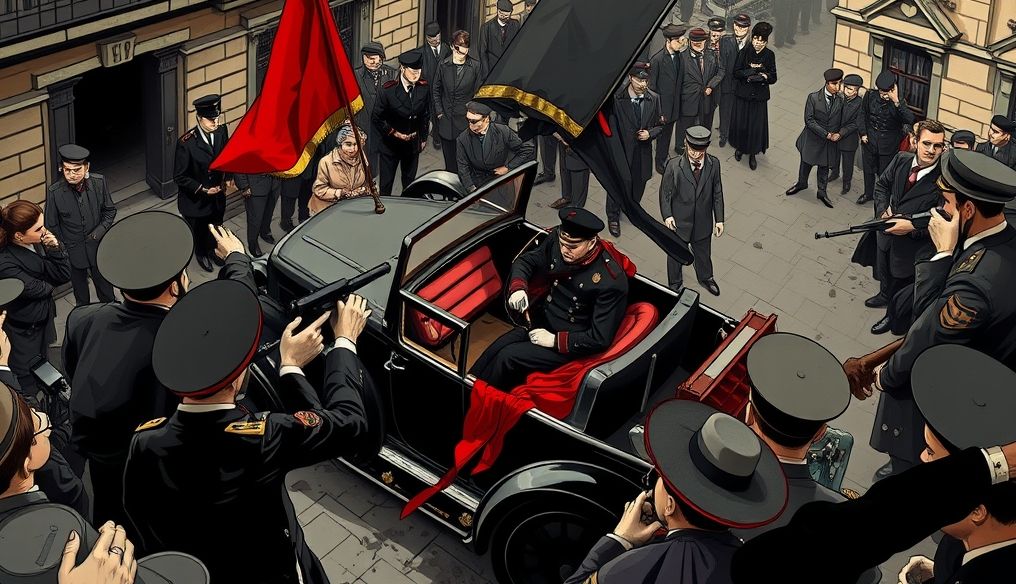Introduction: Europe on a Powder Keg
World War I, which broke out in 1914, was not an isolated incident. It was the culmination of decades of rivalry and conflict between the major European powers. Europe at the beginning of the 20th century was like a powder keg waiting for the spark that would ignite it.
Root Causes of World War I
There are several key factors that contributed to setting the stage for war:
1. Imperial Rivalry:
European powers were fiercely competing for colonies in Africa and Asia. This competition created tensions and animosities between countries, especially between Britain and Germany.
2. Rising Nationalism:
In many European countries, there were strong nationalist movements seeking independence or unification of territories with common ethnic origins. This led to internal and regional conflicts, especially in the Balkans.
3. Military Alliances:
European countries had formed military alliances to protect their interests. The most important of these alliances were:
- The Triple Alliance: Germany, Austria-Hungary, and Italy (later joined by the Ottoman Empire and Bulgaria).
- The Triple Entente: France, Britain, and Russia.
These alliances meant that any small conflict could quickly escalate into a full-scale war.
4. Arms Race:
There was a frantic race between European countries to develop new weapons and increase the size of their armies. This created an atmosphere of fear and mutual distrust.
The Sarajevo Spark: Assassination of Archduke Franz Ferdinand
On June 28, 1914, Archduke Franz Ferdinand, heir to the Austro-Hungarian throne, and his wife Sophie were assassinated in Sarajevo, Bosnia. The assassination was carried out by Gavrilo Princip, a Serbian student belonging to the "Black Hand" nationalist organization.
Austria-Hungary considered Serbia responsible for the assassination and presented it with an ultimatum containing harsh terms. Serbia rejected some of these terms, leading to Austria-Hungary declaring war on it on July 28, 1914.
Reactions and the Chain of Events Leading to War
Austria-Hungary's declaration of war on Serbia triggered a chain of events that led to the outbreak of World War I:
- Russia Mobilizes: Russia, an ally of Serbia, began mobilizing its forces to protect Serbia from Austria-Hungary.
- Germany Declares War on Russia: Germany, an ally of Austria-Hungary, declared war on Russia on August 1, 1914.
- Germany Declares War on France: Germany, fearing fighting on two fronts, declared war on France on August 3, 1914.
- Invasion of Belgium: Germany invaded neutral Belgium to be able to attack France.
- Britain Declares War on Germany: Britain, an ally of France and committed to protecting Belgium, declared war on Germany on August 4, 1914.
Why Was the Sarajevo Spark Enough to Ignite the War?
The assassination of Archduke Franz Ferdinand was not the sole cause of World War I, but it was the spark that ignited a fuse that was already lit. The root causes of the war, such as imperial rivalry, nationalism, military alliances, and the arms race, had already created an explosive environment. The assassination provided Austria-Hungary with a pretext to start a war against Serbia, and the complex web of alliances led to the expansion of the conflict to include most of the major European powers.
Political and Diplomatic Errors
In addition to the root causes, political and diplomatic errors played a significant role in the outbreak of the war. There was a misjudgment on the part of European leaders regarding each other's intentions, and a failure to find peaceful solutions to the crisis. Diplomacy was weak, and reliance on military force was prevalent.
The Role of Public Opinion
Public opinion in many European countries was in favor of war. The press played a significant role in fueling nationalist sentiments and calling for revenge. This public pressure made it difficult for political leaders to find peaceful solutions.
Conclusion: Was World War I Inevitable?
Was World War I inevitable? This is a difficult question to answer. There are certainly many factors that contributed to its outbreak, and political and diplomatic errors played a significant role. But perhaps the war could have been avoided if European leaders had been wiser and more far-sighted.
World War I was a humanitarian disaster that claimed the lives of millions and changed the face of the world forever. It is important to learn from the mistakes of the past to avoid repeating them in the future.
Sources:
- The First World War: A Very Short Introduction by Michael Howard
- The Guns of August by Barbara W. Tuchman
- The Sleepwalkers: How Europe Went to War in 1914 by Christopher Clark




